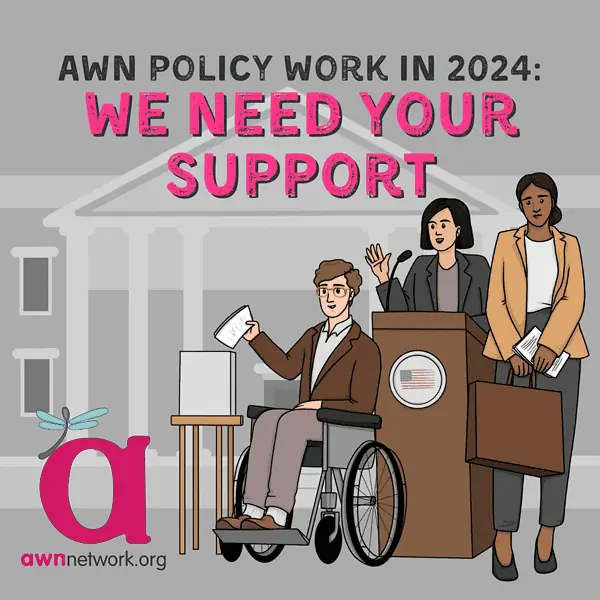Our Crucial Disability Policy Work
I have had the pleasure of being Policy Fellow with the Autistic Women & Nonbinary Network for the last five months. As my time with AWN and 2023 draws to a close, I wanted to share with you my reflections on the themes that connect my personal life to my work at AWN.
My experiences of ableism, maybe similarly to yours, can be summarized as a “no win” situation. Sometimes, society tells us we are not—and never will be—good enough. Then sometimes, society tells us we are good enough, but only because they see us as not like the ‘others.’ I have been put, against my will, into both categories at different times in my life. Neither placement feels just. This fickle and painful whiplash, in either direction, isolates me from the disability community whom I hold most dear. I refuse to buy into baseless hierarchies that pit our disabled siblings against one another.
I carry that very same moral conviction with me in all that I do as AWN’s Policy Fellow. For example, I wrote and delivered separate oppositional testimonies about medically-assisted suicide bills in Massachusetts and the Department of Labor’s nationwide subminimum wage program. On the surface, these policies may seem unrelated. But both instances rely on the aforementioned disability hierarchy that directly hurts me and my loved ones. Proponents of medically-assisted suicide and subminimum wage inaccurately insist that it is impossible to care for people with certain types of support needs.
I called bullshit in both of my testimonies. It is cruel and cowardly to leave some people behind, especially when better policies already exist. Instead of medically-assisted suicide, we need more insurance coverage for supplies and services that increase quality of life, as well as physician training about the intersections of racism and ableism. And instead of forcing disabled people to work in restrictive and isolating subminimum wage jobs, we need to build more disability inclusive workplaces, including better enforcement of the ADA and greater investment in Centers for Independent Living.
AWN serves a crucial role in the disability movement because we educate government officials, doctors, and parents of disabled people that there are better policies out there than subminimum wage or assisted suicide. Our society should not pick and choose which types of disabled people to care for. True liberation can only exist for everyone when we divest from that type of competition and instead build an interdependent world where more is possible.
This past year, AWN took steps toward creating that type of world. The policy team has been hard at work on projects that aim to serve a wide swath of disabled communities, including but not limited to Autistic people, people of color, transgender and nonbinary youth and adults, and those who hold many of those identities. For example: we signed on to eighty-eight (88) of our partners’ letters, comments, and statements; endorsed seventeen (17) bills; and supported five (5) lawsuits. AWN Policy Manager, Elio McCabe, and I also strengthened AWN’s connections with other leaders working at the intersections of trans justice and disability justice policy to ensure our movements remain strong in the long, hard fight ahead. Make no mistake, things are likely going to get worse for trans people in the year to come with even more anti-trans bills at the state and national level, exacerbated by the transphobic and ableist rhetoric that is already showing up in many 2024 election campaigns.
AWN’s policy work responding to this political and legislative landscape in 2024 is going to be tough. And AWN has many ongoing projects through which we’re working to address the material challenges faced by autistic, disabled, and multiply-marginalized people, especially across race, sexuality, gender, and class. But we need your support.
I’m in awe of what our community can accomplish together.
Sincerely,

Nina Stoller
Policy Fellow
Autistic Women & Nonbinary Network

